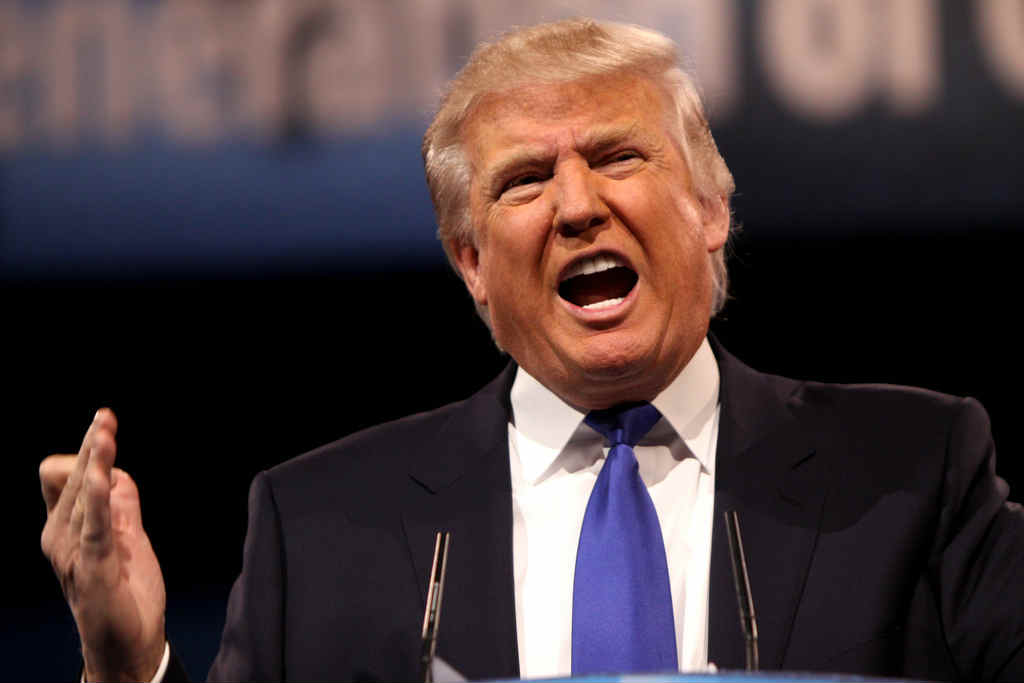 Trump_rant: photo: Gage Skidmore
Trump_rant: photo: Gage Skidmore
Trump’s latest rant is likely to increase resistance to him, argues Des Freedman
Donald Trump has escalated his war against African Americans in a truly bizarre fashion. In a speech on Friday, he attacked black football players who have taken to kneeling down during the playing of the national anthem before matches as a protest against racism and police brutality. He described anyone who ‘disrespects’ the flag in that way as a ‘son of a bitch’ and called on fans who witness this to ‘leave the stadium’.
He followed up this rant with a tweet ahead of the weekend games demanding that the owners ‘fire or suspend’ those players, effectively calling for a boycott of America’s most popular sport if they refuse to do so.

Trump’s actions have been met with huge criticism. Black players have taken to social media promising to step up their opposition while some of the owners have pledged to stand by their teams. Even Trump’s most loyal channel, Fox News, was forced to hedge its bets – acknowledging that the football protests are related to the issues highlighted by the Black Lives Matter movement and that they themselves might not have covered the debate in sufficient detail.
The furore is connected to just one more example of ‘paid patriotism’ wherein the US government has directly sponsored outbursts of patriotism during sporting events. Trump may claim that the national anthem is part and parcel of American football but this ignores the fact that teams didn’t even come out and stand for the anthem until 2009 when it was introduced as a marketing ploy ‘to make the athletes look more patriotic.’ It also ignores the fact that the National Football League was founded 11 years before ‘The Star-Spangled Banner’ was actually designated by President Woodrow Wilson as the national anthem. Like so many other examples of American patriotism and commemoration, these are invented traditions – just like the statues commemorating Confederate leaders, most of which were erected some 50 years after the end of the Civil War.

Players like Colin Kaepernick and Brandon Marshall aren’t the first black athletes to use their status to protest against racism – after all Tommie Smith and John Carlos gave the black power salute from the Olympic podium in 1968 – but they are hugely brave for doing so in a climate in which Trump is deliberately using race to legitimize his authoritarian policies. By dubbing these players as traitors, he is effectively inviting yet more violence against African American communities.
Yet while Trump is polarising the country in a dangerous fashion – lashing out at minorities to distract from the real issues of inequality, climate change, racism and many more problems embedded inside US society – he is also stimulating and expanding the base of resistance. Trump’s visible appeal to white supremacy is both frightening and counter-productive given that he is increasingly seen by the electorate as divisive and untrustworthy. Unable even to guide throughthe Republican’s healthcare bill, we are now seeing its counterpart move centrestage: Bernie Sanders’ proposals for a universal healthcare system has now been backed by 15 Democratic senators and it this approach that has generated huge interest.
Resistance is never automatic nor guaranteed and until we see the emergence of a coordinated response to Trump’s attacks, his appeals to white supremacism and nativism present a huge risk to minority commnities. But we shouldn’t assume that Trump’s base is secure and his recent attempts to placate his supporters by going after some of America’s favourite sporting heroes reveal a frailty and desperation that paints him as a statue waiting to be toppled.

